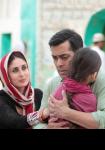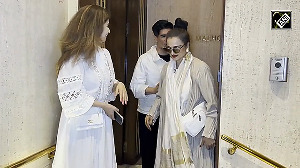'The 1971 War was a great moment in history,' says Lieutenant General Anand Sarup, who was decorated with the Mahavir Chakra for his valour in the 1971 India-Pakistan War.
Nearly 90, he looks back at the men and the moments that forged India's greatest military victory with Rediff.com's Archana Masih.
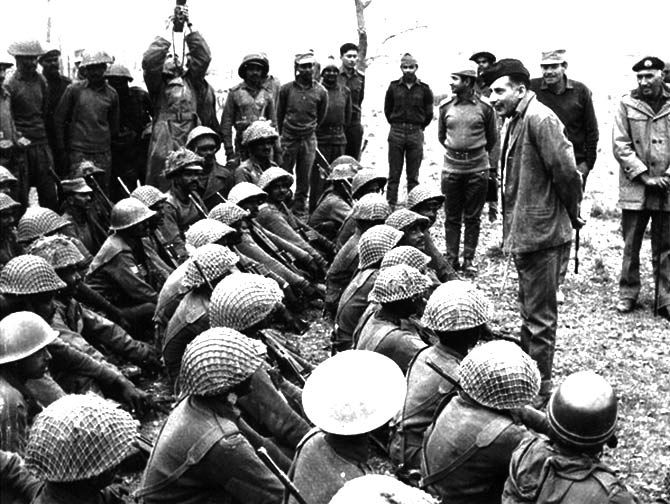
Lieutenant General Anand Sarup was awarded the Mahavir Chakra, India's second highest medal for gallantry in the 1971 war with Pakistan, but is modest about his accomplishment.
"It is important to take whatever comes your way in your stride. You can't make too much of it," says the 88-year-old soldier who bears the gentlemanly courtesies of an era that has faded away.
General Sarup appeared for the entrance exam for the Indian Military Academy just as India became free. At the height of the communal violence of Partition, he made his way from Jalandhar to the exam centre in Meerut, in a vehicle carrying a British colonel and his luggage.
"War is the ultimate test for what a soldier prepares for. '71 is a highpoint of my military career," he says looking back at those days of war.
A brigadier during the War, General Sarup took command of an ad hoc force, the Kilo Force, and welded it into a cohesive fighting unit within a fortnight of the war.
On December 6, his force captured Fenny, the first important town in the '71 campaign that cut off Chittagong from the rest of then East Pakistan.
Brigadier Sarup -- an infantry officer from the 8 Gorkha Rifles, born in Dera Ismail Khan in present day Pakistan -- remained in the thick of battle during the entire campaign.
Ten days later, Brigadier Takisuddin of the Pakistan army surrendered to him in Chittagong. The streets of Chittagong, he says, reminded him of Paris after it was liberated in World War II.
The country honoured him with a Mahavir Chakra for his efficient conduct of battle, leadership qualities, organisation ability and for leading his troops from the front with conspicuous gallantry.
In a conversation with Rediff.com's Archana Masih, the war hero looks back at the men and the moments that forged India's greatest military victory.
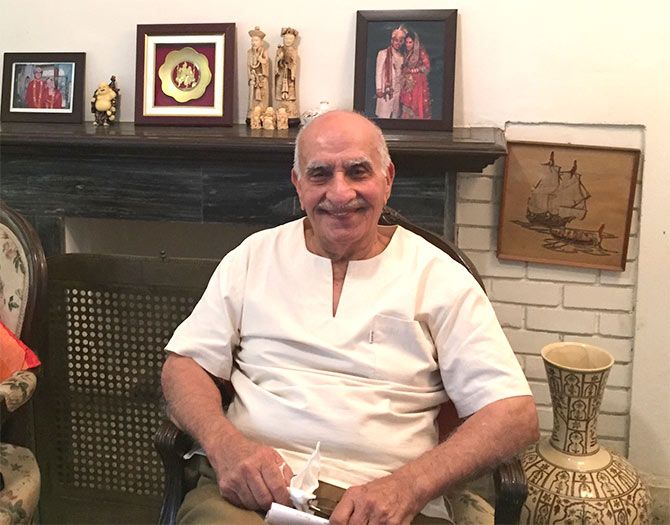
The days before the War
The 1971 War was different from earlier wars. In 1947 when kabailis (raiders) walked into the Kashmir Valley with the help of the Pakistan army, they came and we reacted. We were on the defensive.
In the 1962 war with China, we were again on the defensive.
In the 1965 War, we reacted after Pakistan bombed our air bases -- the only difference was that this time we broke from common wisdom. We went across the International Boundary, nearly captured Lahore and went into the Sialkot sector apart from action across the Line of Control.
The 1971 War was the first time we took the initiative.
We knew war was coming because of Pakistan's continuing genocide in Bangladesh.
What had started in Bangladesh was essentially the language problem -- the imposition of Urdu over Bangla.
It came to a head when Mujibur Rahman won the election with a majority but was not allowed to form a government and was instead interned.
As tyranny and genocide in Bangladesh increased, refugees entered India by the millions. This could have led to social, security and financial problems. How many refugees could India have absorbed and for how long?
We were very lucky to have the field marshal (then army chief General Sam Manekshaw) at the helm of affairs.
He was very charismatic, had a tremendous personality and a sense of humour. He was very generous in his ways (is overcome with emotion).
He had fought and taken bullets in Burma (during World War II) but never had I once heard him talk about it.
Air Chief Marshal P C Lal and Admiral S M Nanda were good leaders in their own right. '71 incidentally was the first time all three services took part in a war.
1971 was a great moment in history -- and when it came -- we were ready for it.
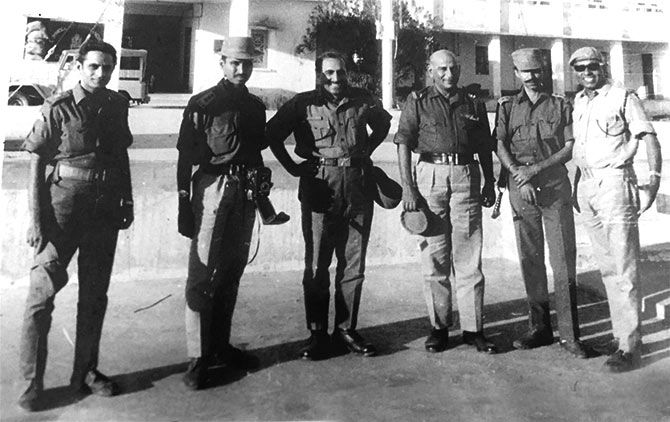
The decision that was the game-changer
In April '71, there was a feeling in some political and bureaucratic circles that we should send the army in immediately -- but the three chiefs resisted and rightly so.
War requires preparedness. In the eastern sector our roads and rail communication were -- if I say so -- primal. I don't think even a telephone wire existed at that time between Agartala and Calcutta. The railway lines were not broad gauge, there were hardly any roads.
One critical decision was that we did not display a knee jerk reaction. The 7, 8 months gave us tremendous advantage.
The army was able to build its logistics, ammunition, troops, rations, manpower and communication.
It gave all -- the government, the diplomatic corps, the media, the civilian hierarchy -- time to prepare.
The diplomats secured a treaty with the Russians and were able to build a lot of public opinion outside.
The US consulate in Dhaka was up against the US government for its bipartisan attitude towards Pakistan and for ignoring the genocide. Blood Telegram reveals this.
They kept sending telegrams to President Richard Nixon and (then) US National Security Adviser Henry Kissinger informing them that public opinion within the people and sections of the government was that Pakistan was in the wrong.
This delay (in declaring war) -- by design or otherwise -- was a critical factor in the outcome.
Why fighting for a cause is important in war
As the genocide increased within East Pakistan, more people joined the Mukti Bahini and the liberation movement took speed. It also made many (in East Pakistan look at India with a different lens.
In December, the passes in the north (the China border) were all closed. This was a critical factor too.
Obviously, confidence and morale builds up when the troops are mentally prepared. We were fighting a righteous cause -- and cause is very important in war.
Meanwhile, the Pakistani troops were getting tired of fighting the insurgents for 8 or 9 months.
Credit should go to the three chiefs, lead by the field marshal -- and to Indira Gandhi.
For the first time she listened to the advice of the chiefs. It had not happened in this country.
My personal opinion is that we've not had the capability to develop a strategic sense as a nation.
In '47, the army was on the verge of occupying the whole of J&K including PoK but we went to the UN and a ceasefire was declared.
If you give away at the outset (what you win on the ground), you have no place for negotiation.
Indira Gandhi agreed to return the prisoners of war (after the '71 War) without taking the understanding that there would be no Line of Control -- and that the International Boundary would be the boundary.
Then when the Chinese walked into Tibet, we accepted their suzerainty without asking them to accept our boundaries in return.
In retrospect, you can say whatever you want to, but history has its place -- the milieu, circumstances, environment that existed is hard to picture all together -- but that's my personal view.
- The Bengalis in East Pakistan had been persecuted and exploited by West Pakistan since 1947. Things came to a head when people revolted after Mujibur Rahman who had won an overwhelming majority was denied the democratic right to form a government and arrested in March 1971.
- Martial law was imposed.
- The Pakistan army unleashed genocide against the civilians in East Pakistan. Hundreds and thousands of Bengalis in East Pakistan were massacred. Ten million refugees poured into India putting a strain on national resources.
- India's political leadership decided to help the Bengalis in the establishment of an independent nation. Military assistance was provided to its armed resistance fighters, the Mukti Bahini.
- The political leadership wanted the army to go to war immediately, but the indomitable army chief General Sam Manekshaw stood up to then prime minister Indira Gandhi telling her that an immediate military campaign would not be successful because of the monsoon. He was right.
- On December 3, 1971 the Indian Army formally joined the war. In 13 days it delivered a humiliating defeat to the Pakistan army and liberated a new nation, Bangladesh.
When war calls a soldier
I was commanding a school for counter insurgency training before the war, but it was temporarily closed because soldiers was preparing for the impending armed conflict. I too was called for war.
I was ordered to take over command of the Kilo Force, an ad hoc force that included two Indian Army battalions with two Bangladeshi battalions. This formation came under the command of 4 Corps.
The offensive in Bangladesh was carried from the eastern side by the 4 Corps, the northern side by the 33 Corps and Western by the 2 Corps apart from small groups like mine.
Our force was raised on November 15. The orders came and I reached Agartala on November 17.
The Bangladeshi battalions and Mukti Bahini (Bangladeshi resistance fighters) were engaged in an insurgency -- raid and get back -- not a conventional war.
The two Indian Army battalions had been raised for fighting Naga and Mizo insurgents and hence did not have heavy weapons like recoilless anti tank guns, medium machine guns or mortars.
So these battalions had to be welded into a fighting force -- and I must say they rose to the occasion.
I would reckon there were 4,000 to 5,000 men under my command.
I took over on November 18 and our small skirmishes began. These small scale ops helped us know the lay of the land. The troops also got used to being fired upon.
When you are fired at for the first time, it is a different feeling -- this is part of what is called battle inoculation.
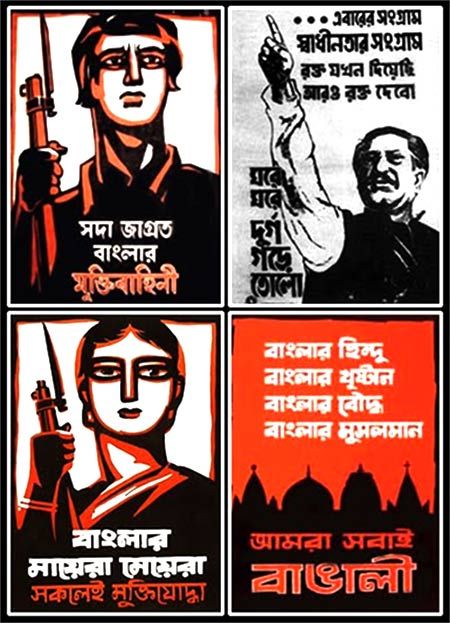
The Fall of Chittagong
The war started on December 3 and K-Force captured Fenny by the 6th.
Fenny sits astride the road and rail route that connects Chittagong to the rest of Bangladesh.
My job was to protect the southern flank of the formations of the 4 Corps, which was commanded by a great leader, Lieutenant General Sagat Singh.
We were given orders to move towards Chittagong. We moved on foot for 4, 5 days because our resources were so meagre.
On the way we also captured a lot of ammunition and prisoners.
We conducted small operations till we reached the defences right outside Chittagong. We decided to attack when news came that Pakistan troops had decided to surrender.
Brigadier Taskinuddin who surrendered to me, had served as an instructor at the Indian Military Academy in Dehradun.
On November 17, myself and a young a captain drove into Chittagong -- I told him that one hears that after WWII when the Allied forces entered Paris all the young girls were kissing the young GIs.
Just then, an old man stopped and kissed me and the young captain chuckled!
People were enthusiastic in Chittagong which shows that all human beings want security and freedom.
After liberation, the two Bangladeshi battalions became assets of Bangladesh. One of the commanders of those battalions, Lieutenant Colonel Zia-ur Rahman, later became the president of Bangladesh in a coup.
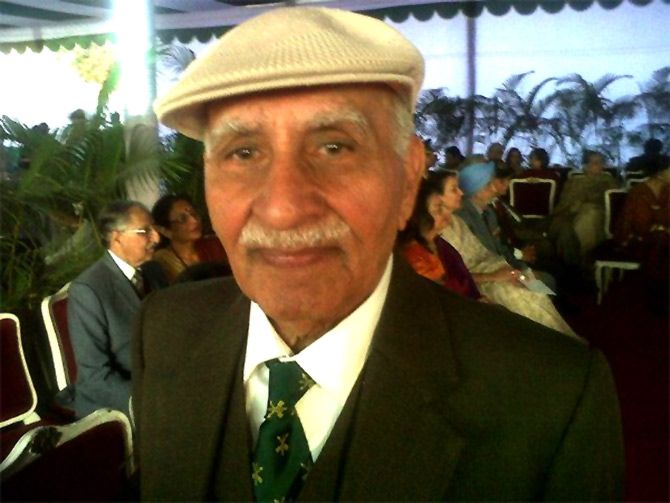
Liberation and after
I led a delegation to Bangladesh in 2014 at their invitation.
For them the '71 War was not only victory for us, but liberation for Bangladeshis.
A retired major general who was a captain in one of the Bangladeshi battalions under my command asked me, 'Sir, you had said a Bangladeshi battalion would be the first to enter Chittagong but you later changed the orders, why?'
In some places unarmed Pakistanis, especially Bihari Muslims who had migrated after Partition and caused as much tyranny as the Pakistanis, were killed for revenge. I told him I couldn't afford to take that risk.
In a war, there is enormous onus and responsibility with the highest level of political and military leadership. It is even more so today when countries are armed with nuclear bombs.
War is the ultimate test for what a soldier prepares for. Hence, I would say, the 1971 war is a highpoint of my military career.
General Anand Sarup was commissioned into the Indian Army in 1949.
He served the Indian Army in Leh, Gurez, Akhnoor in J&K, Sikkim and Arunachal Pradesh and completed three courses in the United States.
He was the commandant of the prestigious Jungle Warfare School in Mizoram just before the 1971 War.
Twenty years ago, General Sarup presented his Mahavir Chakra to his battalion.
He spends time reading, gardening, playing golf and bridge.
This is the first part of Rediff.com's oral history account of the 1971 War.




